Steph W. from SEOPressor


...help you check your website and tell you exactly how to rank higher?


88
score %
SEO Score

Found us from search engine?
We rank high, you can too.
SEOPressor helps you to optimize your on-page SEO for higher & improved search ranking.
By winniewong on July 25, 2015
Google has put a huge amount personalized search into Google’s search engine results page (SERP). This isn’t surprising for most marketers and bloggers, the goal is to get more exposure in order to obtain more web traffic.

However, when optimizing your pages in order to increase your web ranking, you need to understand that search results are personalized to the user. This is something that many people don’t realize – or if they do realize this, it’s something that they overlook. Therefore, sometimes all Rank Trackers get the rank wrongly.
It means that not everyone`s SERP is going to be the same; in fact, almost no SERP will be alike. This makes sense if you think about it, since Google’s ultimate goal is for its search engine to provide the most relevant and high-quality content available to its users, which it can’t do unless it takes into account each individual user.
The following are the factors that Google takes into account in order to personalize its search engine results for each individual user:
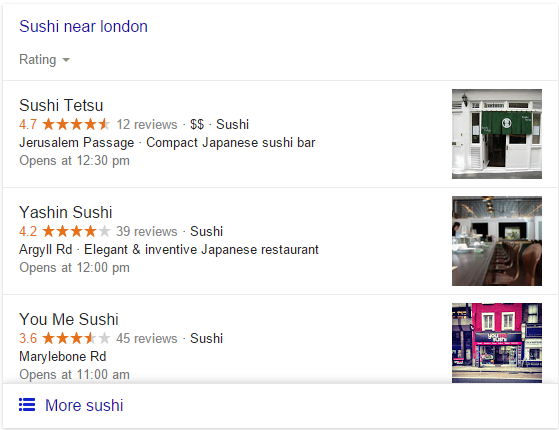
When you enter the Keyword “Sushi Near Me” in mobile devise. Google are using your IP address to determine your location to provide accurate result.
If you live in Manhattan, Google will assume based on your location and your search that you are looking for nearby coffee shops and will display a list of coffee shops located in Manhattan. If you are in Tokyo, then Google will display a list of coffee shops located in Tokyo.
Google takes into account the viewing habits – specifically what genres or types of videos are watched – of individual users when personalizing their search, but it also takes into account interest now as well. If you are interested in a specific topic, Google is more likely to show you the topics you might be interested in, but it might not be very accurate.
Google also uses these “interest” data to help ads reach its targeted audience. Google will rank content that aligns with your interest first before showing others. If you log into your gmail account, you should see your interest in here as well. But it is still incomplete.
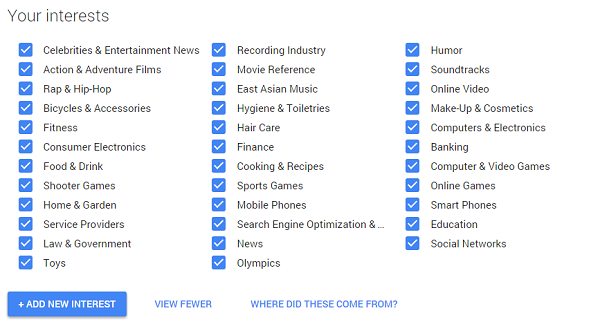
These are my Interests according to Google
According to Google, my supposed interests are listed above. The reality is that there are too many topics listed for which I have no interest in at all.
I do not like celebrity news, Olympics, make-up, fitness or cooking.
How about yours? Did Google get your interests correct?
This proves that Google has inaccurate Interests, and this is partly due to the fact that Google has as one of its sources for prediction of Interest YouTube.
By clicking on a video in Youtube, you earn yourself an interest, but clicking on a video does not mean that the interest from watching the video is the same as personal user interest. Google also tracks user engagement for the video, but whether Google uses these data for search engine and Adsword remains a mystery.

Google takes notice of the video tag you click on YouTube. It will automatically add it into your interests without you knowing.
I think this is a big blow to SEO. If the web is getting more personalized, it will be harder for us to perform SEO, especially since our rank tracker will become less accurate as a consequence.

Google also takes into consideration the multiple devices used by you. Don’t believe me? Check here. You will discover every device you used before with your Google account.

For example, say you have a flight coming up. If you do a search for the airline you are using, then Google may show you the specific flight number and departure time of the flight you are on in your search results.

If you are using Google + yourself, you will realize some articles will be presented to you. If you are interested in Samsung, articles related to Samsung will be presented to you.
Don’t worry that these are just the only list of things that I mention about Google that might be affecting the future of SEO. There are actually thousands of other elements that Google is tracking. Here is the list: Exploring Google’s User Data Collection

There are a number of reasons why Google is focusing so much on creating a more personalized search for its users. First of all, it’s important to remember that Google isn’t the only game in town. There are many other search engines out there, such as Bing or Yahoo!, that Google is competing against, and personalized search does improve the user experience.
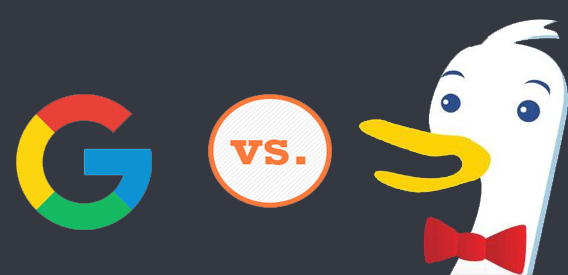
Now I dare you to go use Duckduckgo for 10 days. You will realize the differences of both search engines. If you had used both search engines before, please share your experiences in the comments section below.
At the moment, Google is by far the most popular, but it must continue to give users what they want in order to remain at the front of the pack. Secondly, personalized search is clearly the way of the future. Google isn’t the only company that is implementing the use of personalized search.
Take Amazon for example. You are able to observe their user personalized product results through their product recommendations. If you’ve ever bought a book or a movie on Amazon, you’ll notice that they’ll recommend numerous other books and movies based on your purchase.
They’ll also use recent searches on their website to help make more relevant recommendations. They will also use hyper-personalized communications by using the data they collect to send out personalized emails containing promotions and coupons to its customers.
I just want to say “Personalized is the future”
Another reason Google is collecting all the data is because Google wants to have a powerful, well-targeted advertisement platform[Adswords]. Therefore, a better-targeted advertisement will lead to more marketers using it, which in turn leads to more money for Google. Looking at these numbers in 2011, how much does Google make from Adsword?
Now that you know how Google personalized search works, you’re probably wondering how you can take advantage of this in order to strengthen your SEO. The following are a few tips to help you better optimize your website for personalized search results:
These days, we observe more local personalized search being done on mobile. Thus, Google is shifting its focus towards mobile. Therefore, mobile friendly websites will have an advantage now and in the coming future.
When we create extraordinary content, this helps build up the visit history of our website, something that Google will take into account when personalizing search results for those users by using user history data. If Google sees a solid number of visits to your site. Google will rank your website better as a result. Win-win!
Again, Big Content is something that will make visitors want to return to your website. Each time a visitor returns to your website, it will build user history in Google Data. Google will take that as an important ranking signal.

Google will try to understand human behavior more and try to present the correct information or content that we might like. Personally I do think Google will take user interest to match other user interest. If a user has a positive behavior about a particular content, Google may automatically present a hypothesis.
Based on the hypothesis, Google will predict that other users with the same interest might like this content too. If they do, Google will rank that piece of content high when the same “interest” users search for that keyword
Based on interests, Google may present your website to other users as well. In the meantime, Google will take note about other user’s behavior as well, like time on site, bounce rate and click through rate. If the other user has positive feedback, your content will definitely remain on the first page for the same interest users only.
For example:
Jonny visits a business content site and Google takes notice of the relevancy of the content and his interests. The content and Jonny’s interest share the same keywords.
Therefore, Google forms a hypothesis whereby a user with “businesses” interest will like this content, “The 10 business Strategies You Shouldn’t Avoid It”, and rank it on the first page for other users with “businesses” interest as well.
| Jonny | Brian | Ben | Norris | Jennifer | Kenny | |
|---|---|---|---|---|---|---|
| Demographic | Age 23 Male |
Age 25 Male |
Age 25 Male |
Age 39 Male |
Age 27 Female |
Age 41 Male |
| Interest | Businesses | Businesses | Businesses | Businesses | Businesses | Businesses |
| Time On site | 10 Min | 8 Min | 11 Min | 1 Min | 0.5 Min | 1 Min |
Later on, as more users click on that content, we have here as examples Brian and Ben who find the article interesting and show positive behavior with an average Time on Site of 9 minutes.
However, Norris, Jennifer, and Kenny show negative behavior with an average Time on Site of just 1 minute on that content. Google may take a closer look at other data to find the similarity in Jonny, Brian, and Ben. By looking at the above table, Google will be able to know that these three people are in the same demographic.
Therefore, Google will rank the content better when the users who have the same demographic and same interest as Jonny, Brian, and Ben are using same keywords. It is not necessary to look at just demographics as Google might use other set data to provide content that users like.
Google may assign relevant scoring for each interest of a user. Google can use search history to determine user interest scoring by looking into how many percentages of that interest content relate with positive behavior.
It will be important in the future to target the right demographic for users to see the right content. Different demographics have different perceptions about great user experience.
It is not just about the outlook of a website but also the other details that go into the creation of a great website: the content voice, the content length, images, video and more.
Google knows you cannot design great user experiences for everyone but for only one group. This is another great step for Google. An interesting study shows that different demographics really define their user experiences differently. The study takes into account different demographics and asks them how they would define a great user experience.
[Tweet “User experience for everyone equal to no user experience”]
If you design the wrong content, user experience will lead to a different set of demographics in future. It is kind of common sense for Google to do so because Google does understand that different sets of demographics are attracted to different sets of content.
From the marketing perspective, if will affect your product conversion. Some products do not fit into all demographics. The most obvious examples are clothing, cars, and perfume.
Especially for Millennials, they have a short attention life span. They do not read or share long content. They even named this phenomenon ” TL DR”. ” TL DR” means Too Long, Didn’t Read. Here is an example from Content Creator Digiday that showcases the creative idea of implementing a TL DR filter button to attract Millennial audiences.
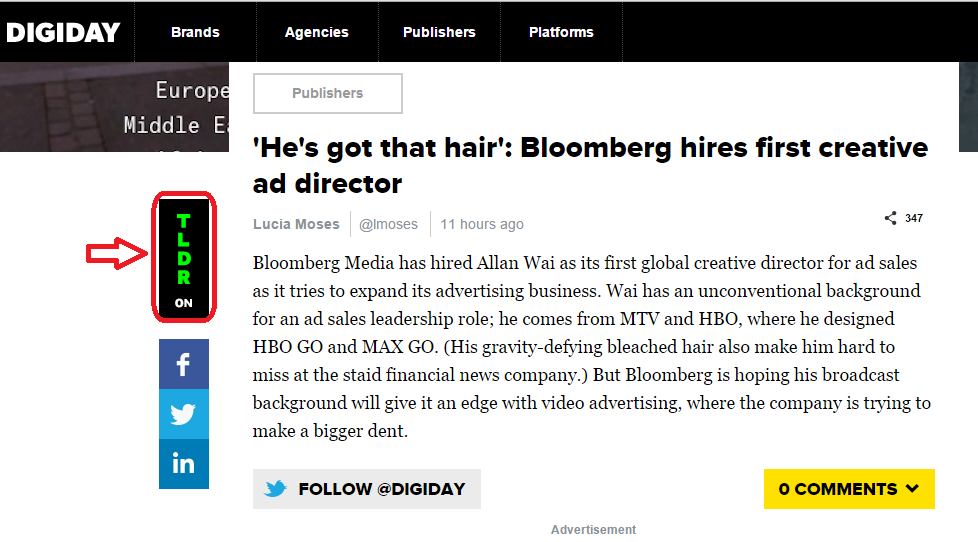
When TLDR button is turned off, it will become long content
Newscred had a webinar with Buzznews about creating content for Millennials. They really believe that you cannot create content for everyone, but you need to create specific content for Millennials.
In the future, Google wants to filter Google search results by giving the content Millennials want to read when they are doing query searches on Google.
Google will be using big data to determine what content are for Millennials and what content are not. Thus, you cannot create content for everyone as no one will love it because the content isn’t targeted at any specific demographic. You have to be careful not to have Google giving you the wrong demographic or interest traffic.
We are seeing evidence that Google wants to understand more about deep language. Just last year, Google invested in two UK artificial intelligence startups to understand more about deep language.
In the future, it is quite possible for Google to even understand the context that your keywords are used in, such as whether it is sarcasm or being straight. I also predict that we content marketers can declare our content’s interest and user demographic to Google, but I think this will be unlikely because Google sees the potential abuse of it.
Google is going for context. In the marketing realm, we call it context marketing. Context marketing is all about delivering the right message to the right person via the right medium, at the right place and at the right time.
Google wants “Google Now” to be the right medium for context marketing. The search feature is actually something Google wants to phase out.
They eventually want their users to be provided with information without having to look for it, based on context. For example, if a user is looking up directions on Google Maps, Google may eventually be able to recommend coffee shops along the way that the user has looked up before based on their web use history.
Not to mention that the average Android smartphone user only does an average of 1.3 browser searches a day. Mobile users prefer downloading apps that will provide them with the information they want, which is why Google just released Google Now.
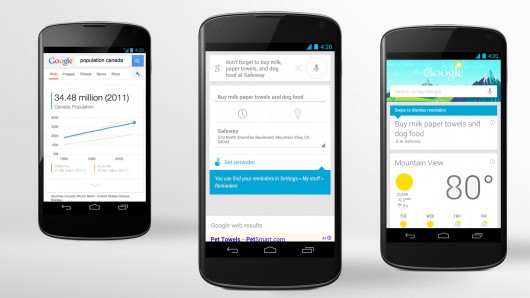
Google Now is an app that allows users to choose information cards relevant to them that they can flip through without doing searches. For example, one card could have the current weather on it while another could have the previous day’s baseball scores. This is Google’s endgame for personalized search.
User A without enhanced context experience

User A, who is male, just lost his working bag in France. Therefore, he needs a new bag and goes to Google to search for “Buy bags for work”. Many search results are presented to him. Then, he goes through all of the top 10 results only to find nothing that he wants is there.
Now, he keys in the keyword “best bag for work” and realizes that all of the displayed content is about bags for women but not for men! Then he goes and adds another keyword “best man bag for work” and clicks on each content and goes through each picture one by one again. Then frustration kicks in and he gives up.
User B with enhanced context experience

Meanwhile user B also lost his bag and is searching by entering the keyword “Buy bags for work” too. Immediately, Google Now will ask for the characteristics that he is looking for for his bag, such as materials, price, color, and fashion style.
After considering the chosen options, Google will return with the men’s bag result because Google knows that he is looking for a men’s bag, not a women’s bag. Google Now will also show the results from previous Google Interest users who’re also looking for men’s bag with his feedback or review.
User B is able to tick the items that he wants in the Wanting list. Therefore, user B has less but more accurate results. After all that, user B is able to compare all the bags. Since Google knows that user B dislikes online shopping based on history data, Google will show any available stores nearby instead. Google Now will also find discounts and coupons for User B. After completing the purchase, Google Now will ask user B for a review.
User B is provided with the surprise coupon which helps him buy the bag he wants at a cheaper price, but the huge difference here is that Google Now provides the unique and accurate user experience.
In the future, Google Now will have the data to understand user wants and needs more accurately than now. As you can see, user A’s experience is one of frustration, whereas user B gets all the required information he needs and wants in a well sorted, timely and presented manner.
THIS IS THE FUTURE
Larry Page did mention in Wired News
“Google has been moving in this direction with tools like Google Now that try to anticipate what you need to know before you ask”
In the future, no one will use keyboards anymore, everything will be done through voice. Therefore, it is also important for us to understand voice intent and to figure out where our content belongs to which voice intent. In the future, Google Now will be a personal assistant.
Therefore, Google will show a snippet of your content based on voice intent. But how does Google know which part of your content answers to which intent? For example, you have a content about knowledge graph. Voice Intent is “What is Pad Thai?”. Google needs to know which part of your content answers the voice intent, and Schema is the solution for now.
However, in the future Google will use deep language to answer it. It can also go beyond that. While the user is learning about Pad Thai, based on the user data, if the user has the interest in cooking and cooking recipes, Google will also ask the user whether he or she needs a recipe for Pad Thai. If the user has the interest in eating, Google will give the directions to the nearest Pad Thai restaurant.
The biggest questions of all are “Will there be a place for us[SEO] ?” “How deeply can Google read and understand the context of a content?” ” Do we need to optimize our content for Google deep language?” and “Can we still benefit from this?”
Personalized search is something you need to keep in mind when optimizing your website. Many marketers and bloggers only pay attention to what Google wants when it comes to adjusting and improving their SEO strategy. However, you would be wise to focus on what users want instead since this is what Google is focusing on.
Related Post:
You Can’t Believe It, Content Marketing Is Going To Evolve Again
How To Measure Content Marketing ROI
How to Quickly Fix These 11 Major Blogging Mistakes Made By Newbies
Updated: 20 February 2026


Save thousands of dollars (it’s 100x cheaper)

Zero risk of Google penalty (it’s Google-approved)

Boost your rankings (proven by case studies)
Rank High With This Link Strategy
Precise, Simplified, Fast Internal Linking.
